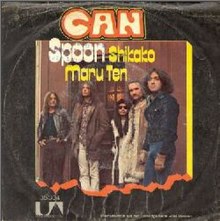| "Spoon" | ||||
|---|---|---|---|---|
 German single picture sleeve (1972) | ||||
| Single by Can | ||||
| from the album Ege Bamyasi | ||||
| B-side | "Shikako Maru Ten" | |||
| Released | Early 1972 | |||
| Studio | Inner Space Studio, Weilerswist, near Cologne | |||
| Genre | Krautrock | |||
| Length | 3:03 | |||
| Label | United Artists | |||
| Songwriter(s) | Can | |||
| Producer(s) | Can | |||
| Can singles chronology | ||||
| ||||
| Music video | ||||
| "Spoon" (Official Audio) on YouTube | ||||
"Spoon" is a song by krautrock group Can, recorded in 1971. It was originally released as a single with the song "Shikako Maru Ten" on the B-side. "Spoon" also appeared as the final track to the band's album Ege Bamyasi later that year.
Contents
The song marked Can's first recorded use of drum machine coupled with live drums, an unusual feature in popular music at the time. The single reached #6 on the German singles chart in early 1972 [1] as the signature theme of the popular German television thriller Das Messer [ wd ] (1971). The single sold in excess of 300,000 copies. [2] Due to the single's success, Can played a free concert at Kölner Sporthalle in Cologne on February 3, 1972. [3] [4]